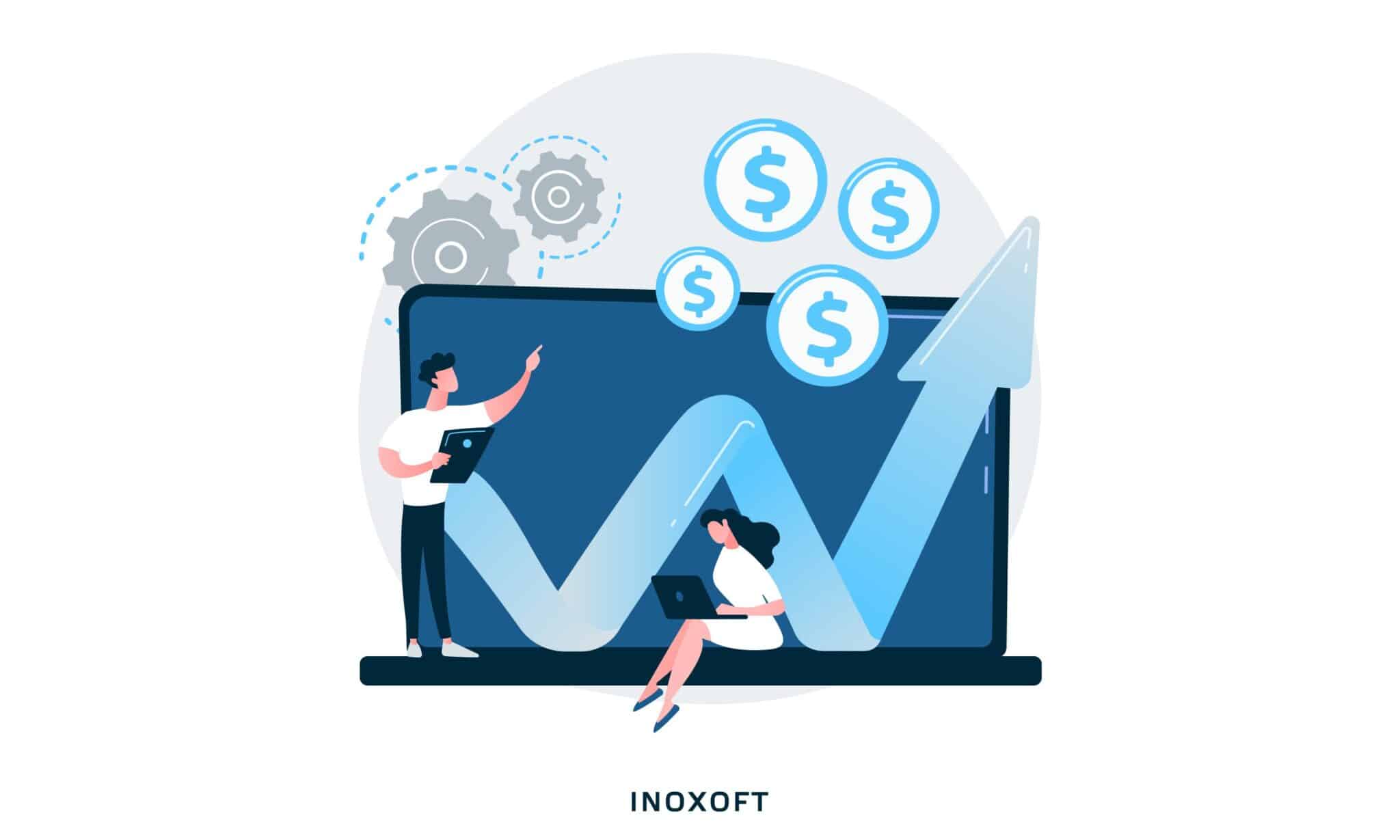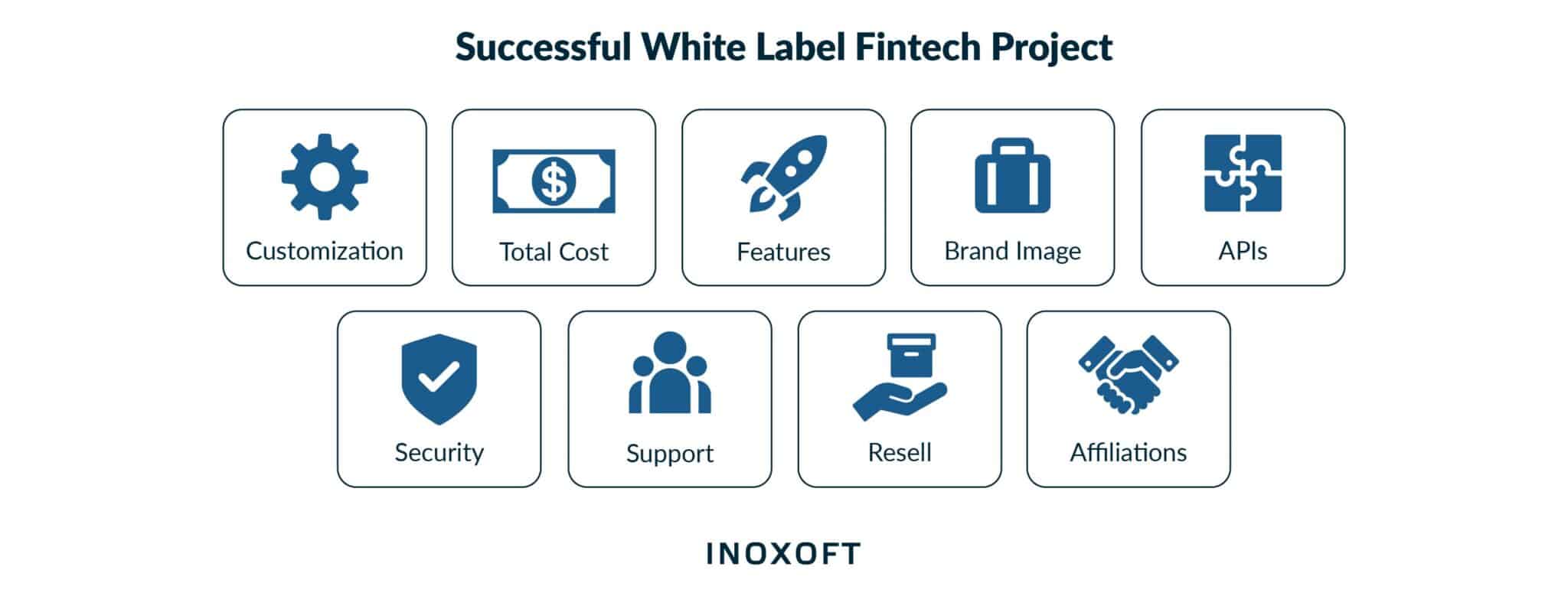White labeling is a strategic business practice prevalent across various industries, including fintech, where companies rebrand and sell products under their own name. In this comprehensive guide, we delve into the ins and outs of white labeling in the fintech sector, exploring its benefits, risks, success factors, top providers, and real-life use cases. Discover out how white label fintech solutions affects your business, and how to create a successful white label fintech project with Inoxoft.
- What Exactly is White Labeling?
- White label software model in fintech
- What are the Main Benefits of a White Label Fintech Platform?
- What Makes White Labeling Different from Other Partnerships?
- How Can White Label FinTech Platform Affect Your Business?
- Superiority over competitors
- Better resources allocation
- New possibilities
- More loyalty
- Are There Any Risks of Using White Label Fintech Services?
- How to Create a Successful White Label Fintech Project?
- Customization
- Total cost
- Features
- Brand image
- APIs
- Security
- Support
- Resell
- Affiliations
- Top 5 White Label Fintech Platform Providers
- Plaid
- Tink
- Q2
- Bankable
- DriveWealth
- Real Life Use Cases of White Label in Fintech
- Final Thoughts
- Consider Inoxoft’s Team of Experts to Build Your Own White Label Solution
What Exactly is White Labeling?
There’s no doubt that everyone has seen grocery stores that sell goods with their store’s name at slightly lower prices than other products – a good old example of white label products. Nevertheless, this practice is quite popular in other industries, including retail, marketing, e-commerce, and finance and banking business.
White labelling is a legal process of rebranding and selling the product manufactured by one company with another company’s name, design, etc. The point is that the company-seller produces the product with a “white” or blank label, while the company-buyer puts their brand on it. Later they present the product to the customers, who might assume the company-buyer is the original creator. This practice is exceptionally convenient for those who don’t have the resources (or desire) to create products independently but are willing to hop on the market as soon as possible.
White label software model in fintech
Fintech white label is a partnership between a fintech software development company and a financial institution. With the intention of delegating software building from scratch, a fintech company can receive a third-party finance product that meets all their needs and expectations. The financial solution providers, aka the third-party, are the ones who bear responsibility for the development process and also licence the right to distribute the final product.
For instance, a company has a brilliant idea that will significantly influence the gamification in banking, but doesn’t have enough resources to make their own software. The company pays for fintech white label financial solutions, which basically means off-the-shelf software with the required technology stack. They adjust the software to their users’ needs, label their brand, sell their financial services and make a fortune.
What are the Main Benefits of a White Label Fintech Platform?
- Lower project cost: By investing in fintech white label software development, you save money from being spent on various resources. You also save yourself from extra headaches since you delegate the process to the hands of professionals.
- Software robustness: It’s much more rational to accept the opportunity to use already tested, time-proven, and not error-prone solutions than to reinvent the wheel that would require lots and lots of testing.
- Time-efficiency: The fewer stages you have to go through, the sooner you can launch the product. With a ready-to-go white label fintech platform that requires minor adjustments and customization, you can focus on other processes to perfect your product.
- Brand credibility: Your customer will remember your product by their impression from using it. To gain user satisfaction and have a true brand identity, a company must produce modern financial products that offer only valuable solutions. And a reliable software development company that provides outstanding white label service in fintech will help you do that!
What Makes White Labeling Different from Other Partnerships?
The distinctive arrangement of white label collaboration raises questions about ownership, branding authority, and customer perception. To delve deeper into the intricacies of white labeling in fintech projects and its distinctions from conventional partnerships, we must explore key aspects that set it apart in white label partnerships.
|
Aspect |
White labeling |
Reselling |
Co-branding |
Affiliate relationships (Introducer) |
|
Definition |
The other company provides unbranded products or services to your company, who then adds own branding and sells it as theirs. |
The other company sells its products or services to your company, who then resells them under their own brand. |
Your company collaborates with the other company to create a product or service with both brands prominently displayed. |
The other company pays your company for referring customers to their products or services. |
|
Branding |
End product bears your company’s branding, with no visible trace of the other company’s involvement. |
You sell products under your own brand, without any mention of the other company. |
Both companies’ branding is prominently displayed on the product or service. |
Customers are aware of the other company’s involvement, but the primary interaction is with yours. |
|
Control |
Your company has control over marketing, pricing, and distribution, but rely on the other company for product development and fulfillment. |
Your company has control over marketing, pricing, and distribution. |
Both companies have equal say in decisions regarding the product or service. |
Your company has control over marketing efforts and customer referrals, while the other company handles the product or service delivery. |
|
Customer Interaction |
Customers interact directly with your company, who handles sales, support, and service. |
Customers interact directly with your company for sales, support, and service. |
Customers recognize both companies’ involvement in the product or service. |
Customers are referred by your company to the others company’s for products or services. |
|
Revenue Sharing |
The other company typically receives a fixed fee or a percentage of the revenue from sales to your company. |
The other company receives payment for the products or services provided to your company. |
Revenue is typically shared between both companies based on the terms of the co-branding agreement. |
The other company compensates yours based on a predetermined referral fee or commission structure. |
|
Risks and Rewards |
The other company takes on the risk of product development and fulfillment, but may have a steady revenue stream from the partnership. |
Your company takes on the risk of marketing and selling the products or services, but has the potential for higher profits. |
Both companies share the risks and rewards of the co-branded product or service. |
Your company has the potential for earning commissions based on successful customer referrals, with minimal risk. |
How Can White Label FinTech Platform Affect Your Business?
In finance, the number of startups that decide to take the software “off-the-shelf” is increasing with lightning speed. White label fintech is an absolute choice even for traditional banks that choose to turn into digital ones: current age requires less paper and banknotes and more remote control systems. That’s why digital banks, mobile payment companies, and other fintech startups wouldn’t wish to have a poor quality of their services.
The following points will be dedicated to figuring out how a white label fintech platform can improve your business:
Superiority over competitors
Everyone wants to remain number one among the others. The level of competition reaches unprecedented altitudes when keeping up with the leading-edge development trends. By choosing fintech white label software, your company decides to spend less and pay more attention to multiplying supremacy over the market.
Better resources allocation
With the help of white labelling fintech solutions, you don’t have to ponder the workflow of the development team or the latest fintech solutions trends. This risk mitigation path allows your company to reap the benefit of the software development company’s technical expertise and focus on the tasks you perform the best. Thus, you can concentrate on developing your brand from the marketing perspective, working with your client base, and upgrading your products.
New possibilities
Banking companies are not the only ones who can receive a positive outcome from such popularity of fintech white label financial solutions. If you are a complete newbie to this industry with finite resources, the variety of fintech white label services is waiting for you! This way, you can easily try your hand at a brand-new business and contribute to the industry.
More loyalty
Customers will sooner or later figure out that your product is high-quality and lower in price than the competitors’ proposition. Applying your own branding to the product that satisfies users’ needs influences your identity as a brand, unquestionably, in a positive way. As a result, you get plenty of loyal customers who would choose your product over others in a heartbeat.
Are There Any Risks of Using White Label Fintech Services?
Unfortunately, yes. Risks are always a thing, so we must look both ways before crossing the road. Let’s look at the possible challenges that you might face in case choosing white label fintech products:
- Limited control: Not having the steering wheel of the software development process might slightly weaken your confidence. Either way, relying on someone else’s technology instead of building your own takes you away from the opportunity to influence the process. Moreover, there might also be issues with scalability and upgrades, which you always have to discuss with the code owner.
- Data safety: Since white labelling in finance is software as a service solution (SaaS), everything is stored in the cloud. So keep in mind that all the data, including yours, can be jeopardized.
- Postponed release: All the app stores platforms properly examine every single app they publish for copying and spamming. (Once Apple had even banned white label apps on their App Store!) They do not tolerate replicas, so there is a chance white label fintech applications might be removed from the app stores.
The path of choosing a white label solution in fintech is not as treacherous as it may sound. For instance, data leakage is practically impossible (only in cases when a company neglects the choice of the development company). To avoid being banned from App Store and Play Store, you must stay away from ubiquitous designs and create your own signature style. Nevertheless, you might need to consider building your own platform to have more power over the development process. And in the last case, you are fully responsible for your brand’s reputation.
How to Create a Successful White Label Fintech Project?
Now, it’s high time we discussed the success criteria for creating a lucrative white label fintech project. Here are all the things you need to consider before the beginning of the development process:
Customization
Personalization in banking is crucial to gain users’ trust and meet their needs. Make sure that your software provider will build a product that can be easily modified to suit your brand and market demands.
Total cost
Clearly outline the budget you can spend on developing fintech white label software. You might also want to discuss the cost with your development team to figure out the pros and cons of allocating more or less money.
Features
Having a calculated budget and set deadlines, you can easily agree on what features you should keep and what, unfortunately, you have to leave behind. Don’t be afraid to have heated debates with the dev team – there’s no other way to do it!
Brand image
Focus on your branding so that people will fall for your product by maintaining a consistent brand experience across all customer touchpoints, including the software interface.
APIs
Make sure the software supports integration with third-party services: payment gateways, data providers, and other fintech tools. Don’t forget to provide comprehensive API documentation to facilitate seamless integration for your clients.
Security
Adhere to industry-specific regulations and standards (GDPR, PCI-DSS, etc.) to protect sensitive user data. Try to prevent all the issues by conducting periodic security audits and stay updated on emerging threats and best practices.
Support
Learn how to deal with the support system that helps users to notify you about possible issues. Think about offering training resources, tutorials, and a knowledge base to empower clients in effectively using fintech white label financial products.
Resell
Define a transparent and competitive pricing model that incentivizes third-party companies to sell your white-labeled software. Consider providing marketing materials, such as brochures, case studies, and demo videos, to help clients promote the software.
Affiliations
A strong relationship with your software provider will ensure alignment on project goals and objectives. Establish clear agreements regarding revenue sharing, branding guidelines, and responsibilities.
Top 5 White Label Fintech Platform Providers
In the dynamic landscape of modern fintech, competition runs high, which leads to a proliferation of white label financial services. In this scenario, finding a provider with a professional approach to white labeling might be arduous. The good news is that we’re more than excited to recommend the top five white label fintech providers that know it inside out.
Plaid
Plaid offers a robust technological platform that equips businesses with the essential tools to build digital financial systems. Their API enables applications to seamlessly integrate with users’ bank accounts for budget management and fund transfers. Renowned fintech brands like Charity Water, TransferWise, and Robinhood chose Plaid’s platform services to enhance their offerings.
Tink
Tink provides open banking solutions that allow companies to create fintech projects – their comprehensive suite encompasses payment initiation, account aggregation, data enrichment, and personal finance management. The list of Tink’s partners include BNP Paribas Fortis, Klarna, Nordea, and ABN AMRO.
Q2
Q2 is a leading fintech company providing a comprehensive digital banking platform to financial institutions ranging from community banks to credit unions. They offer a suite of services, including online and mobile banking, bill pay, and person-to-person payments. landscape.
Bankable
Bankable offers a wide range of white label banking and payment solutions. Their platform enables businesses to launch branded payment products, including e-wallets, mobile wallets, P2P money transfers, and prepaid card programs, accessible as self-service platforms with a white label option and through API integration.
DriveWealth
DriveWealth is a fintech company that specializes in providing white label investing platforms, which enable financial institutions, wealth management firms, and fintech startups, to offer brokerage services and fractional share trading to their customers or clients under their own brand.
Real Life Use Cases of White Label in Fintech
A prominent Dutch bank, ABN Amro partnered with Tink, whose technology forms the foundation of their new banking app – Grip. One of its standout features is its ability to access and track multiple bank accounts simultaneously. This means that even non-ABN Amro customers can utilize the technology to its fullest extent. This partnership showcases how established financial institutions can leverage white label solutions to deliver innovative customer services.
Beyond traditional banking, white labeling has found traction in the realm of accounting and payroll services. Industry giants like BDO and PwC have embraced white labeling as a strategic tool to scale their financial solutions and enhance their value proposition, resulting in comprehensive financial management services.
Keeping up with the trends, financial software vendors (Quickbooks and Visma) have incorporated white label solutions into their offerings. By doing so, they can provide tailored financial management tools to a diverse range of businesses and extend their product portfolios and effectively address specific market needs.
Final Thoughts
Implementing white label fintech solutions is an incredible yet risky offer. On the one hand, it’s a phenomenal tool to bring top-notch solutions to the market and upgrade existing ones (like creating the best payment gateway in the USA, because why not). But on the other hand, the danger of choosing the wrong team is too severe and might lead to a complete disaster.
Nothing should stop you from carrying out a brilliant idea that needs to be shown to the world. To create the most pleasing platform for financial management purposes you dreamed about, you must find a suitable and qualified company to become your loyal partner.
Consider Inoxoft’s Team of Experts to Build Your Own White Label Solution
Inoxoft is an international banking software development company that helps people and companies competently invest in the development of fintech software solutions. We always make sure our clients receive applications with the best quality and functionality, as well as the following:
- Third-party integrations
- Support with various payment systems
- Great UI/UX experience
- Wealth management and advisory services
Providing finance software development services, Inoxoft presents digital opportunities to help your company significantly contribute to the Fintech industry. Choose our company to create your own white label fintech product with our team of professionals. Don’t hesitate to contact us to receive all the details and start your project implementation confidently.
Frequently Asked Questions
What is an example of a white label product?
A good old example of white-label products lies on the shelves of grocery stores: goods with the store's name that cost slightly lower than other products.
What is white label fintech?
It’s a partnership between a fintech software development company and a financial institution. With the intention of delegating software building from scratch, a fintech company can receive a third-party finance product that meets all their needs and expectations. The financial solution providers, aka the third-party, are the ones who bear responsibility for the development process and licencFe the right to distribute the final product.
What is white labelling banking?
White labelling banking or banking as a service (BaaS) is a process in which banks share their application program interfaces (APIs) with third parties who can build their own financial solutions.
















